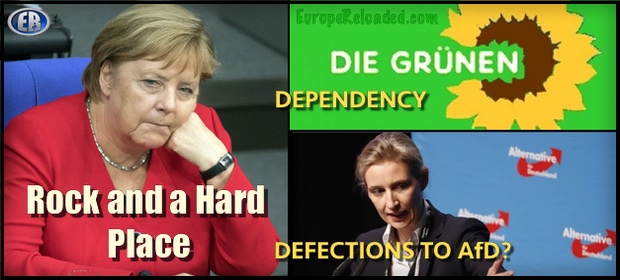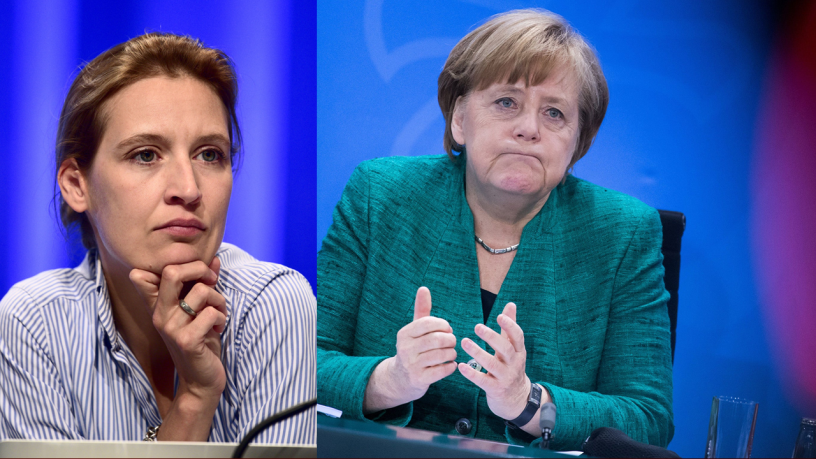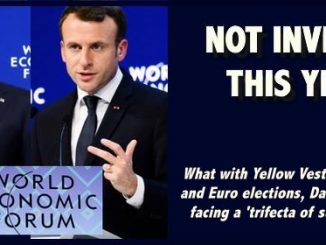
Verboten In Thuringia – Merkel’s CDU Feels AfD’s Heat
The fallout from the disastrous election results in Thuringia for the major Germany political parties continues unabated.
Sputnik is reporting this morning that local members of Angela Merkel’s ruling Christian Democratic Union (CDU) have officially petitioned the party to allow them to negotiate with the local chapter of Alternative for Germany (AfD) in coalition talks.
Here’s the relevant part from the site Talking Europe that mentions what’s happening in Thuringia:
But last week, the deputy caucus leader for the CDU in the state legislature in Thuringia said the party should not rule out working with the AfD.
And this week a group of seventeen CDU officials in the state put out an open letter arguing that their party should not refuse talks with any “democratically elected parties.”
Among the signers are city council members, officials of local CDU committees, and one state legislator.
CDU policy is not going to change because of an open letter put out by a small group of very low-level officials. The national leadership vehemently rejected these officials’ open letter.
But these seventeen dissenters represent some unknown larger number of CDU members and voters who might leave the party over this issue.
As I mentioned in my latest article for Strategic Culture Foundation, the results in Thuringia preclude any kind of rational government forming because no one is willing to work with AfD, who now has substantial political power.
Whereas in 2014, Die Linke could form a government with the SPD and the Greens, today they cannot, falling 4 seats short of a majority, and the Greens barely beat the 5% threshold for representation. Had they not, the coalition calculus would be unsolvable.
It is just as bad for Merkel and the CDU as they categorically refuse to ally with AfD in any capacity. So, there is no easy path to a government in Thuringia. The path is just as bad in Brandenburg, which voted in September.
In both cases, massive cartel-style coalitions will be needed, four parties, to cobble together a majority because all have refused to entreat with AfD.
What all of this implies is that Merkel and the CDU are more than willing to work with either the Social Democrats (SPD) or the Greens in forming coalitions, but not any of the more Euroskeptic parties like AfD and Die Linke (The Left).
Because, in fact, Merkel has been working with both parties for years at both in the Bundestag and the Bundesrat. Think of the Bundestag as the House of Commons, which proposes legislation and the Bundesrat as the House of Lords which ratifies it.
As was pointed out to me by German political observers, the game Merkel has been playing by working with the SPD in the Bundestag (ER: German Parliament) only works if she keeps the Greens in the Bundesrat (ER: upper house of German Parliament representing the 16 federated states or Lander) happy.
But because of the nature of the Bundesrat, where state delegations must vote as a block up until Thuringia, the Greens held veto power over 37 out of 69 seats there and could stop all legislation cold.
But those four seats now will likely go to someone else, and this defection by CDU party members in Thuringia threatens a constitutional crisis in Germany if AfD make it into the Bundesrat.
So what’s important here is that with these three state elections over the past two months, the makeup of the Bundesrat will shift dramatically. And this is the truly dangerous development for Merkel.
Brandenburg still doesn’t have a government and the results there imply that the CDU, SPD and Greens (Jamaica coalition) get together to circle the wagons and form a coalition to offset the total loss that is Thuringia. Both Brandenburg and Saxony could do this.
So, if Merkel has any political pull left with the SPD and is willing to give every concession to the Greens they ask for, this is what will happen to stop a loss of majority in the Bundesrat.
Because if they don’t come to that conclusion, there is the further problem of the CDU/Green coalition in Hesse collapsing because they rule with a one-seat majority. But AfD has challenged the apportionment there and could gain a seat, taking down the Hessian government.
That’s five seats in the Bundesrat that Merkel et al would have to make up.
This forces Jamaica coalitions in Saxony (+4 seats) and Brandenburg (+4 seats) to offset losses to AfD in Hesse (-5 seats) and Thuringia (-4 seats) to maintain net loss of one seat to the Green veto and maintain control at 36 seats.
Either way, Merkel is still at the mercy of the Greens, who can erode what’s left of her power base even more than it was before.
I have no idea how likely this all is, but looking at the situation, this is the only math that makes sense here. Merkel failed to put together a Jamaica coalition in 2017 after the national election.
The Greens will likely push for all they can get, which, by the looks of Merkel’s newly-adopted energy policy, is enough to plunge Germany into 2nd world status in the next 20 years.
Next, there are the lengths to which the party leadership of the SPD is willing to go to keep things as they are. The party congress in December may decide that radical change is needed and force an overthrow of Merkel as the price for keeping the coalition intact until the next scheduled general election in 2021.
Lastly, there is the reality that after hitting a low point earlier this year, AfD is beginning to rise in the national polling, back towards 15%.
Again, they need to be a broad solutions-based alternative, not just the Anti-Merkel party to breach the 16% Chasm and become a real political force nationally.
A collapse of the ruling coalition or infighting at the state level to protect the Bundesrat should only fuel more discontent with politics as usual.
So, too, will continued contraction of the German economy thanks to Merkel’s unwillingness to put Germany first ahead of her political career and the demands of the European Union.
And don’t think French President Emmanuel Macron is not watching all of this and rubbing his hands together with glee.
Germany is in real trouble politically as the people sense its leadership is no longer fit for the job. The only thing holding things together on the surface is sclerotic party bosses and their unwillingness to shift with the times.
The more deals Merkel makes with the Greens to maintain power, the more she will alienate her own party faithful, like those 17 upstarts in Thuringia.
That shift may be forced upon them sooner than anyone wants to admit.
************
Original article
Featured image: Angela Merkel courtesy of DPA; Alice Weidel courtesy of Getty.

••••
The Liberty Beacon Project is now expanding at a near exponential rate, and for this we are grateful and excited! But we must also be practical. For 7 years we have not asked for any donations, and have built this project with our own funds as we grew. We are now experiencing ever increasing growing pains due to the large number of websites and projects we represent. So we have just installed donation buttons on our websites and ask that you consider this when you visit them. Nothing is too small. We thank you for all your support and your considerations … (TLB)
••••
Comment Policy: As a privately owned web site, we reserve the right to remove comments that contain spam, advertising, vulgarity, threats of violence, racism, or personal/abusive attacks on other users. This also applies to trolling, the use of more than one alias, or just intentional mischief. Enforcement of this policy is at the discretion of this websites administrators. Repeat offenders may be blocked or permanently banned without prior warning.
••••
Disclaimer: TLB websites contain copyrighted material the use of which has not always been specifically authorized by the copyright owner. We are making such material available to our readers under the provisions of “fair use” in an effort to advance a better understanding of political, health, economic and social issues. The material on this site is distributed without profit to those who have expressed a prior interest in receiving it for research and educational purposes. If you wish to use copyrighted material for purposes other than “fair use” you must request permission from the copyright owner.
••••
Disclaimer: The information and opinions shared are for informational purposes only including, but not limited to, text, graphics, images and other material are not intended as medical advice or instruction. Nothing mentioned is intended to be a substitute for professional medical advice, diagnosis or treatment.





